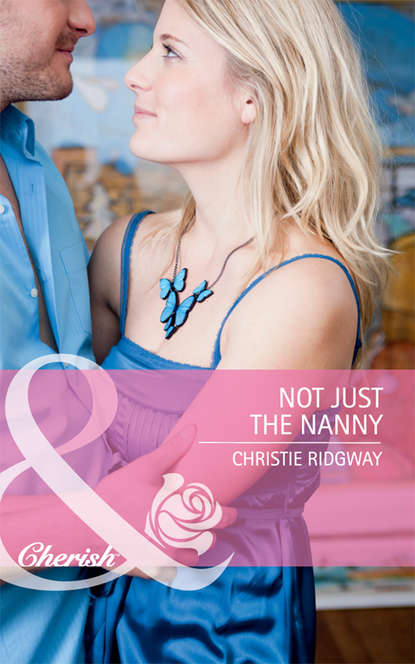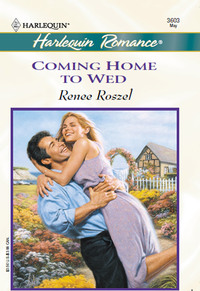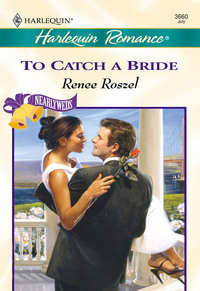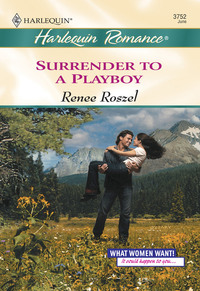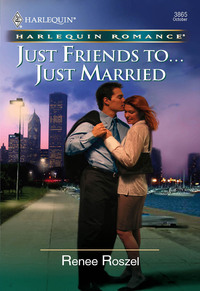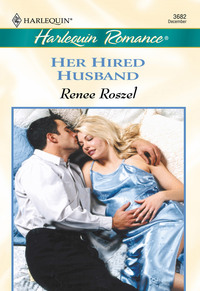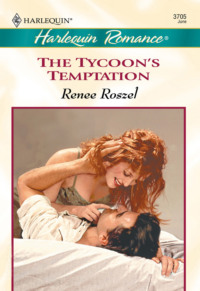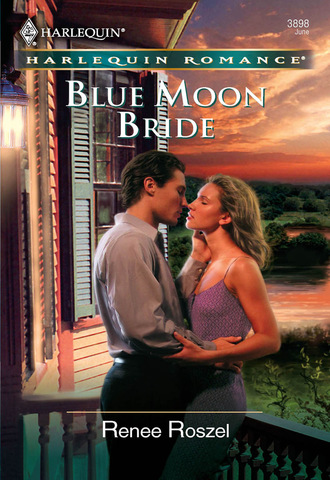
Полная версия
Blue Moon Bride

“I don’t, for a second, see you as a believer in fate.”
“Really?” Roth answered.
His eyes were riveting. Hannah couldn’t think or move. A strange combination of fear and anticipation began to sizzle along her nerves.
“Assumptions, Miss Hudson, can be dangerous,” he murmured. “You hardly know me.”
His hand suddenly cupped the back of her head, drawing her face to his. Hungry, searching lips covered hers. The boldness of his act sung through her veins, his kiss more potent and delicious than she dared admit. Her arms snaking around his shoulders, she leaned in, breast to chest, her body’s response an explicit “yes.”
As surprisingly as it began, his kiss ended. Roth’s fingers trailed slowly, deliberately downward, pausing at her nape. “You’re right about one thing,” he whispered. “I don’t believe in fate.” Cunning fingers drifted languidly on, southward along her spine, until his hand came to rest provocatively, just below the small of her back. “But, I love a challenge.”
Praise for Renee Roszel
A Bride for the Holidays
“…an endearing romance. The charming way these two characters find their happily-ever-after will leave a smile on your face.”
—Romantic Times BOOKclub
Bridegroom on Her Doorstep
“Renee Roszel at her best with characters and dialogue that are real and entertaining…”
—Romantic Times BOOKclub
Her Hired Husband
“Renee Roszel…charms readers with two lovable characters, humorous scenes and a cozy love story.”
—Romantic Times BOOKclub
Blue Moon Bride
Renee Roszel

MILLS & BOON
Before you start reading, why not sign up?
Thank you for downloading this Mills & Boon book. If you want to hear about exclusive discounts, special offers and competitions, sign up to our email newsletter today!
SIGN ME UP!
Or simply visit
signup.millsandboon.co.uk
Mills & Boon emails are completely free to receive and you can unsubscribe at any time via the link in any email we send you.
Renee Roszel has been writing romances for over two decades and finds it hard to believe she’s had such a dream career for so long. Over the years she’s traveled to far-flung, exotic places such as the USSR (before the breakup) and to Germany’s East Berlin (before the wall tumbled). She has toured her native America, too, scuba diving in Hawaii, the Cayman Islands and Florida Keys. Her grown sons live in Illinois and Florida, making for farther fun vacation visits. At present, she and her husband have just finished building their own home on Grand Lake in northeastern Oklahoma, where Renee looks forward to continuing her writing, inspired by the tranquility and native beauty of one of Oklahoma’s most celebrated waterways.
Renee loves to hear from her readers. Visit her Web site at www.ReneeRoszel.com
Books by Renee Roszel
HARLEQUIN ROMANCE®
3752—SURRENDER TO A PLAYBOY
3778—A BRIDE FOR THE HOLIDAYS
3865—JUST FRIENDS TO…JUST MARRIED
To Linda Fildew
My Editor, My Friend
CONTENTS
CHAPTER ONE
CHAPTER TWO
CHAPTER THREE
CHAPTER FOUR
CHAPTER FIVE
CHAPTER SIX
CHAPTER SEVEN
CHAPTER EIGHT
CHAPTER NINE
CHAPTER TEN
CHAPTER ELEVEN
CHAPTER TWELVE
CHAPTER THIRTEEN
CHAPTER ONE
HANNAH found herself smiling for the first time in weeks. She gazed up at the moon. It hung in the night sky, centered in an arched window of the last standing wall amid the ruins of an old stone church. From her perch on a granite garden bench, Hannah stared, transfixed, at the glowing orb so improbably framed in the vaulted opening that once housed stained glass.
The spectacle was even more unique because it was the second full moon this month. “A blue moon,” she whispered, wondering how many others had witnessed the awe-inspiring sight from this enchanting perspective. Her tentative smile lingered. She was glad that the proprietress of the inn suggested she come out here. The wildflower garden emanated quiet and peace, the perfectly framed moon adding a touch of magic. For the moment her troubles receded enough to allow her to feel briefly uplifted. Or at least not completely demoralized, as she had since quitting her job a month ago.
She sighed, unsettled by the profound gloom she heard in her tone. But how else should she feel after discovering she was a water cooler joke?
How could she have let Milo Brisco turn her into his puppet? Caught up in her mindless infatuation for the smooth-talking lawyer, she had let him convince her to bleach her perfectly respectable dark blond hair to “Marilyn Monroe platinum,” and change the natural, curly way she wore it into a sleek, extreme style that took an hour to achieve every morning. Not to mention how he had persuaded her to forgo her moderate office attire and allow him to choose trendy, hip, patently sexy, clothes.
She experienced a surge of self-condemnation. How could she have been so blinded by her weakness for the man to allow him to manipulate her? She thought she had more backbone than that. Obviously she was wrong.
Two years ago, after her parents’ divorce, she committed herself to being an independent woman, hanging on to no man for survival or fulfillment. Her parents’ ugly split taught her that much: no man’s midlife crisis and panting search for a trophy wife would devastate her as it had her mother. Dorothy Hudson was left alone, depressed, reduced to eking out a living as a burger joint cook.
On the other side of that coin, neither did she intend to become a clingy, passive nincompoop like Cindy, her philandering father’s latest trophy gal-pal, barely twenty. The empty-headed twit was six years younger than Hannah.
Determined never to become a “Dorothy” or a “Cindy” she had redoubled her efforts at building a solid career. Then, four months ago, she fell hard for Milo Brisco. “The egomaniac jerk,” she mumbled.
The first blow came suddenly and rudely when she overheard him bragging around the office about his “ingenious” transformation of her. She covered her ears wishing she could erase the sound of his voice, but knowing she would never drown out the memory of his crowing, or the sneer in his tone when he boasted, “Roth and I had a good laugh about how I turned a mediocre middle manager into serious arm candy!”
Arm candy! She cringed. Were two more brutally sexist words ever uttered by a man?
That was bad enough, but the second, and much worse blow, had been the one, foul word, mediocre. That mean-spirited description broke her heart every time she thought about it. Hannah had worked hard at her job. She thought she more than earned her salary. Managing the finance department wasn’t flashy or earth shaking, but even with the day-to-day tussles she had with her subordinates, dealing with their personality quirks, screwups and petty jealousies, she ran a pretty smooth department. At least she’d thought so.
Then to hear herself belittled by a man who supposedly cared for her? She felt shamed and betrayed. She knew she could have lived down an office affair and the “arm candy” swipe, but mediocre? For nearly five years she’d done the best job she knew how for Jerric Oil, so clearly hard work and doing her best weren’t enough.
“And Roth laughed!” she muttered. Roth Jerric laughed. She’d found the charismatic company president and founder attractive, and had a great deal of respect for him. Misplaced, as it turned out. He thought of her as mediocre!
Enduring a grisly sleepless night after being humiliated and insulted, she realized trying to prove herself “not mediocre” would be a fool’s errand. After all, she’d done her best. Evidently her best had been laughable to the company president. Consequently, disillusioned, her self-confidence wrecked, the next morning she resigned.
So now, with her savings dwindling, she needed a job. But more than that she needed to prove to herself that she was not mediocre. How did a person do that? What if she really was mediocre and never would be better than “average”?
No! she told herself. Hannah Hudson you are not mediocre. Sure, she’d made a fool of herself over Milo. That mistake was easy enough to fix with dark blond hair dye and a donation of flashy clothes to charity. But the mediocre label dogged her, hurt her. How did she disprove that? She wasn’t sure, but she planned to do it or die trying.
“I’ll show you, Milo,” she muttered. “You, too, Roth Jerric!”
“Excuse me?”
The male voice intruding on Hannah’s reverie brought her head up with a jerk. A moment of disorientation scattered her wits before she realized the voice had come from behind her, the general vicinity of the garden’s stone path. With self-protective dispatch, she scooted around to face whoever had spoken. Her brain was on the verge of issuing the “stand up” command when a man came into focus, brightly illuminated in the moonlight. Witnessing his starkly lit features short-circuited the command to stand, and she froze where she sat.
Not him!
She recognized the sharp angles of his face. Those strong, rough-cut features had always held a masculine, sensual attraction for her, but in such naked illumination the effect of light and shadow transformed mere handsome into a stunning picture of symmetry and strength. Her breath caught painfully.
She knew those eyes, too. They appeared dark and bottomless in the false light, but she knew them to be sky-blue and compelling. She also recognized the assertive set of his shoulders and the way his raven-black hair tapered concisely to his collar. What she didn’t know was why fate decided to play this cruel trick on her.
Why was Roth Jerric, of all people, eavesdropping on her most private thoughts—just when she’d spoken his name, now repugnant to her? It took a few seconds to find her voice. When she did, she blurted, “What are you doing here?”
He appeared surprised by the edge in her question. Apparently he was unaccustomed to being persona non grata. “Walking,” he said, his brow crinkling in a slight frown.
His looming presence, aglow with reflected moonlight, gave him a godlike aura. Maybe it was because he was so tall, or because he wore a white dress shirt and light trousers, but the effect was disquieting. She could feel her pulse rate jump. That annoyed her. Why must her body react so strongly to a man who dismissed her with a laugh. Emotionally unraveled, her confidence damaged, she didn’t need this—this ultrasuccessful, ultradominant—SOB around.
Her stress and frustration mutated into anger. “I came out here to be alone. To think.” That wasn’t totally true. She came out here to be alone, true. But she didn’t want to think. She wanted to blank out completely. Just breathe deeply and try to find a little calm.
“So did I,” he said. “I didn’t see you.”
“Strange. I’m lit up like a firecracker.”
His brow crinkled further. “If I bruised your ego for not noticing you, miss, I apologize. I was lost in thought.”
“My ego isn’t the point.” He’d called her “miss.” Why? He knew her well enough to laugh at her! Provoked, she pushed up to stand. “Pretending you don’t know me is insulting.”
He appeared troubled. She couldn’t decide if the expression was residue from whatever he’d been thinking about, or if he was having trouble maintaining the fiction that he didn’t know precisely who she was. “Have we met before?” She watched him as he scanned her face. “You do look familiar.”
She crossed her arms. “I should. I worked for you for nearly five years, the last six months as your finance manager.” According to you, your mediocre finance manager, she added mentally, swallowing hard. She wished she could throw his insult back at him, but she couldn’t bring herself to, couldn’t bear to hear it out loud again. Close to tears, she fought to keep her lips from trembling.
His eyebrows dipped in apparent concentration.
She wasn’t sure if she was more disconcerted that he didn’t appear to remember her than if he’d slapped his thigh, chortling, “Oh, right, right, right—you’re the mediocre manager and Milo’s arm candy!”
“I’m the arm candy.” She flinched. How could she have said that out loud? She’d meant to say her name.
His reaction, at first, was no reaction at all. After a second when he blinked and squinted at her, she knew he knew. “The arm…?” He paused for a heartbeat, then added, “Oh.”
That quietly spoken “oh” had the impact of a ton of bricks falling on her. She felt sick, especially now that she sensed he hadn’t recognized her. She didn’t look much like she had the last time he saw her. Her severe platinum hairstyle was gone, transformed to its original dark blond, curly, shoulder-length style. Plus she wore jeans and an oversize T-shirt rather than the body-hugging, sexy-sophisticated attire of Milo’s choosing.
Darn her impulsive nature. She could have made it through this detestable encounter without him recalling her, if she’d only engaged her brain before her mouth.
Sadly the damage was done, so she might as well salvage what she could of her pride. Straightening her shoulders, she clasped her hands before her, working to appear strong and as little like arm candy as possible. “My name is Hannah Hudson, until recently your finance department manager. I resigned at the end of May.”
He inclined his head slightly, appearing to absorb that as he scanned her face again. “Of course. Miss Hudson.” He said her name without a hint of a snicker or sneer. “I remember you now. Since your promotion we’ve been in several meetings together.”
“Once or twice,” she corrected. “Usually your VP of finance presided.”
“You look different,” he said.
“Yeah, well, I’ve joined the ACA.” His puzzled expression didn’t surprise her.
“The what?” he asked.
“It’s ‘Arm Candy Anonymous.’”
He smiled as though finding her sarcasm clever, “Forgive me for not recognizing you.” He held out a hand, long-fingered and steady. She experienced a tremor of hesitation. Did he expect her to take it? Besides having a reputation for enjoying plenty of arm candy himself, and for being married to his work, he was known for his diplomacy. “To be fair, I was at a disadvantage. Your face is in shadow.”
He had a point—about her face being in shadow—but she ignored it, just as she ignored his outstretched hand. “You’re not staying here, are you?” She prayed for his response to be no. When she won her free two-week stay at the quaint inn on Grand Lake in Northeastern Oklahoma, she’d been euphoric. She needed distance from Jerric Oil and Oklahoma City, not to mention precious time to heal, to recover her self-confidence. She planned to use this trip to reevaluate where she was going and what she wanted to do with her future. Having anybody at the inn aware of her poisoned reputation at Jerric Oil would put a huge damper on her recovery—most particularly if that somebody’s name was Jerric.
“I’m a guest here.” His grin grew crooked and wry. “You know, Miss Hudson,” he went on, “questions like that can be hard on a man’s ego.”
“For how long?”
“How long will my ego suffer?”
Was he trying to make her crazy? “No! What is it with you and egos?” She licked her lips, nervous. “I’m asking how long you’ll be here?”
“A couple of weeks.”
Horrible news. The worst possible news. Not that she was hard on his ego. It could use some filing down. The horrible news was that he would be a guest at the inn as long as she. “Oh, no. That’s how long I’ll be here.”
“Ouch,” he said with a exaggerated cringe.
“Sucks, doesn’t it,” she grumbled, “discovering somebody doesn’t find you all that terrific.” She experienced a rush of vindication. “Try seeing it from my perspective,” she said. “I’m sure you can understand why I might be upset that you’re here.”
“Not really.” His response held a note of impatience, as though her continued digs were taking a toll on his ability to remain diplomatic.
That was too bad. “I’m here to get away from—from everything that reminds me of—of…” She shrugged, arms outstretched. “You know.”
“Not really,” he repeated.
“Oh, please.” She spun away. “You know why I had to leave Jerric Oil.”
“I assume you got a better offer.”
“That’s what you assume?” she asked, sarcasm edging her tone. “Well, you assume wrong.”
He said nothing for a moment. The warm, June breeze ruffled the flowers. They rustled in the darkness, seeming to gossip in whispers. “Then why—”
“Don’t you dare ask me why I left!” she cut in. Talk about nerve! She plunked down on the stone bench, grimacing at the pain in her backside.
“But you seem upset, and I—”
“You think?” she demanded. “If you don’t mind, I’m not in the mood to chat.”
The night breeze rustled the flowers again. They bobbed and nodded, giving rise to more stage whispers. After a stressful few seconds, Roth Jerric cleared his throat. “If you’ll excuse me then?”
She clamped her fingers over the edge of the bench and stared straight ahead, looking at nothing. If she didn’t respond, he’d get the idea, even if he was as dense as the granite she sat on.
“It was fascinating visiting with you, Miss Hudson,” he said, his remark clearly cynical. She wanted to smart-off but managed to keep her mouth shut. It didn’t give her any satisfaction, but she wanted him to leave, and that wouldn’t happen if she kept their exchange going.
She began a calming count to ten. One…two…three…“Okay!” She spun around. “Just so you get it, I am no man’s arm candy, and hearing Milo smirking around the office, objectifying me that way, and knowing—others— agreed…” She wanted to say, You for instance. So unstrung with doubt about her ability, she couldn’t bring herself to acknowledge the rest. She went on with what she could admit. “Naturally I couldn’t stay at Jerric Oil after that.” Too late, she wished she hadn’t revealed that much. She bit her tongue for its betrayal.
Roth had begun to move toward the inn, but stopped with her outburst. For an instant he appeared startled, then he chuckled deep in his throat.
Laughing?
At her!
Again!
Okay, if he wanted war, he could have war. “You have a warped sense of humor, Mr. Jerric!”
He shook his head. “You’ve got to be kidding.”
Had she heard him right? “Kidding?”
“Yes, kidding.” He looked dubious, and vaguely amused.
Amused! She burned with resentment. “Not at all!” She knew her cheeks blazed bright red and was grateful for the darkness. Feeling feisty, she shot to her feet. “Obviously you find my humiliation a total hoot.”
He started to speak, but she threw up a halting hand. “Don’t. Your judgments don’t interest me. Just go.”
She could tell by the play of shadow and light across his jaw he clenched his teeth. After a drawn-out silence, he nodded curtly, broke eye contact and strode off along the stone path.
She watched his exodus until she realized what she was doing, then she turned away. After a few minutes, she managed to calm down. She lifted her gaze toward the vaulted window in the old, stone wall. The moon no longer hung dead center in the space, but was set off-kilter in a corner. She felt as askew as it looked.
Unbidden, her attention slid back to the inn. In the distance she could see the ghostly image of Roth Jerric disappearing around the corner toward the front porch. She closed her eyes. Struggling to compose herself she sucked in a breath of fresh, night air.
“Okay, Hannah,” she whispered. “For the sake of your healing, keep your distance from…” She faltered on the words, so she went on silently…from that smug, disturbing SOB, Roth Jerric.
Roth walked away from Hannah feeling like crap. Of course, he already felt that way when he began his walk, but his brief encounter with the woman on the bench left him not only annoyed but confused. He didn’t need a fortune teller to see that she hated him, but he couldn’t imagine why. He’d spoken to her at meetings on occasion, or nodded a casual hello in the elevator from time to time. But he’d never said anything to upset her, let alone cause her to resign.
And he certainly hadn’t been laughing at her out there. He’d simply been incredulous that she would quit her job over anything Milo had said. The man was a competent lawyer, but on a personal level Roth found him to be a blowhard and a braggart. Had Miss Hudson given him half a chance he would have said so. Clearly his opinion was as unwelcome as his presence.
“Let it go, Jerric,” he muttered. “You have problems of your own.” He bounded up the steps to the inn’s expansive front porch and walked across the wooden planking toward the screen door. It was a different screen door from the one he remembered from his youth, when this house had been his family home. But it had the same rusty screech when pulled open.
The scarred oak door was the same one from all those years ago. He recognized it, even painted white instead of the bright green he remembered. He paused, his hand on the brass doorknob, its oval shape familiar in his grasp. It seemed smaller than it had when he lived there. He supposed it should, since he was ten when his family moved from this house, originally the parsonage for the old church which had burned down in 1919.
The house was a century old, but well-built. It had gone through many incarnations since the demise of the countryside church. When Roth lived there the property was their chicken farm. After his father died, his mother moved him and his older sister, Grace, to Oklahoma’s state capital, where she worked as a secretary. He’d never returned to his childhood home until today, when he made the sudden decision to get away from the rat race, seek out his roots. He could no longer avoid dealing with an inner struggle growing inside him, gnawing, eating away at his soul.
He was disillusioned with the conflict between his aspirations and the reality of his life. However successful he appeared on the surface, he was not a happy man. The disillusionment began with his disappointing marriage and the death of his month-old son, Colin. Not long after the infant’s death, his teetering marriage collapsed. That was six years ago. Since then, he had closed off emotionally, throwing himself into work.
He supposed, to his colleagues, he seemed like a golden boy, enviable for his wealth and swank bachelor lifestyle. But in truth, he was in crisis. So, in a moment of nostalgic weakness, he’d sought out his family home, now the Blue Moon Inn. He hoped to recapture a time he remembered fondly, before life became a succession of tough negotiations, 24/7 business stress, bitter disillusionment and gut-wrenching loss.
He leaned against the door, tired all the way to his bones. As far back as he could remember, he got everything he went after. Yet whether his fault or not, he had lost what had been most dear to him—his wife and son. Everything else he had, money, power and success, seemed pale and flat by comparison.
He’d come to the Blue Moon Inn to get back his boyhood exuberance, and that’s what he planned to do. He straightened and sucked in a deep breath. Enough of this maudlin self-pity. He twisted the knob and strode inside.
The inn’s brightly lit foyer brought into sharp focus the worn wood floors and moldings, faded oriental rugs and dark oil paintings in need of cleaning. There were other art pieces tacked to walls. Newer works. Some exhibited talent. Others, in his opinion, ran more to smeared and spattered monstrosities.


